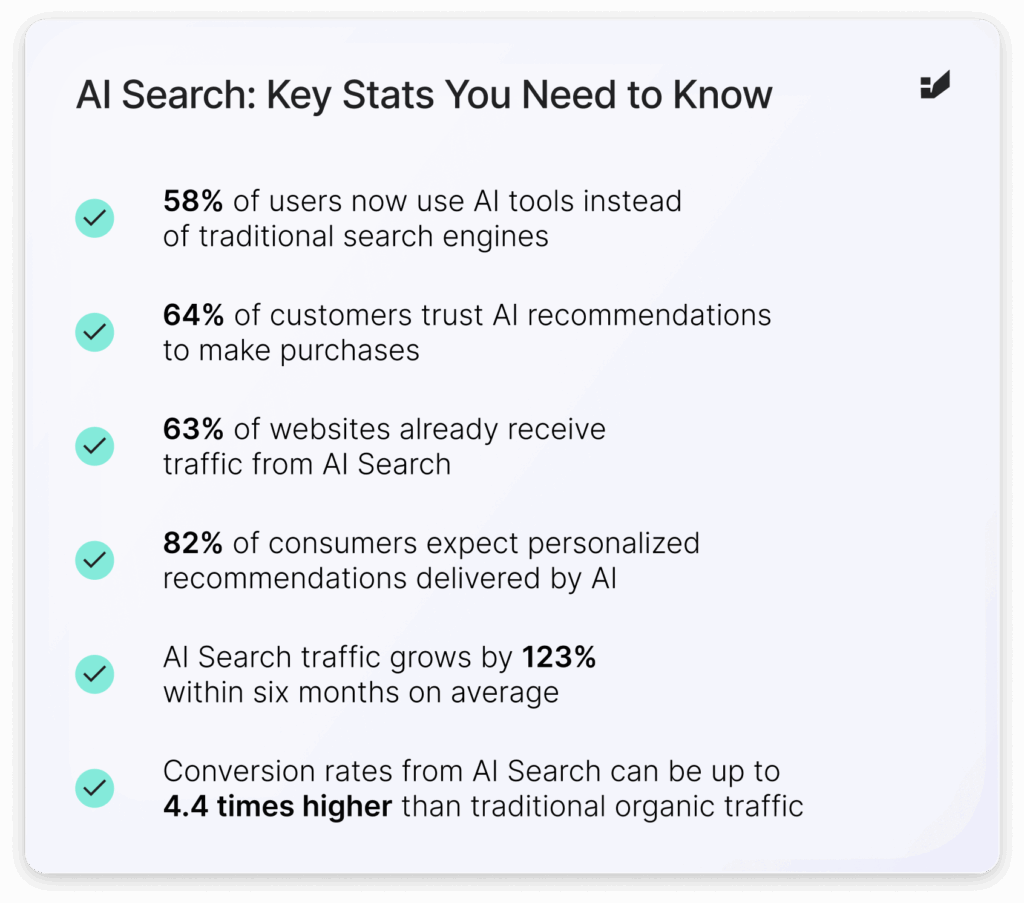AI Search 101: what business owners need to know
Until recently, one of the main indicators of effective brand positioning in organic search results was a high rank on Google. That’s where consumers began their decision-making process - scrolling through listings and choosing companies that appeared on the first page.

Today, things look very different. More and more users are turning to tools like ChatGPT, Perplexity, or Gemini for answers – tools that don’t show links but instead generate direct responses.
And in those responses, your brand might appear as an AI recommendation, or not appear at all. This is a new search ecosystem, growing faster than anyone could have predicted.
AI Search: A channel growing faster than any other
We’re well past the testing phase. It’s already happening at scale, and the data confirms it.

All this leads to one clear conclusion: AI Search is becoming a new, independent customer acquisition channel. It doesn’t rely on Google rankings but on visibility in the answers generated by large language models (LLMs).

What does AI Search visibility bring to your business?
Being “visible to AI” means much more than just a visit to your site or a click on an ad. It’s a new level of brand presence in the digital ecosystem, built on trust and recommendation. Users don’t have to scan multiple links or compare sources – they receive a ready-made answer from an AI model, and your brand may be featured in that answer. If it is, that means for many customers, you already are the best answer to their question.
Here are 5 clear benefits your business can gain by showing up in AI-generated answers:
1. Credibility built by artificial intelligence
AI recommendations are like modern word-of-mouth marketing – on a massive scale and without your direct involvement. If a tool like ChatGPT, Gemini, or Perplexity mentions your brand in response to a query, you’re treated as a trusted source. It’s not you claiming to be an expert – it’s AI doing it for you.
2. A shorter decision-making path
In traditional search, users bounce between dozens of results before deciding. With AI Search, this process is dramatically shortened. The answer is specific, personalized, intent-based, and ready for action. As a result, users who land on your site are already at the later stages of the sales funnel (BOFU) – ready to get in touch, subscribe, or buy.
3. An edge over bigger players
While large brands appear more often in AI recommendations due to recognition and citation volume, AI Search can be especially valuable for smaller businesses. According to Ahrefs, AI Search traffic accounts for a larger portion of total traffic on smaller sites. For websites with fewer than 999 monthly visits, the share of AI traffic is statistically higher than on large sites with over 10,000 visits. This means a smaller, consistently managed business can outperform bigger players in AI recommendations – if it ensures presence in the data that trains these models.
4. Traffic that’s independent of Google updates
Google’s algorithm updates can drastically impact traffic in a short time. AI Search visibility, on the other hand, is a Google-independent channel for reaching customers. Even if your SERP rankings drop, you can still be cited by AI as an expert source – and continue generating valuable traffic.
5. Better conversion rates
Users who come to you through AI Search are not just browsing for answers – they’ve already received one. They’re landing on your site because AI sent them there. These are users with intent, trust, and higher readiness to act. As a result, conversion can be up to 4.4 times higher than with traditional organic traffic.
AI visibility is an investment in your future traffic
All of the above leads to one key insight: AI Search is a new, fast-growing customer acquisition channel that strongly influences purchasing decisions. Unlike traditional SEO, it is less vulnerable to Google’s algorithm fluctuations and is built on context, trust, and the quality of information.
From a strategic perspective, this is a long-term investment. Actions you take today may result in a steady flow of high-quality traffic over time.
In a world where more and more purchasing decisions stem from a single AI query, the question is no longer “Is it worth it?” but rather: Can you afford to ignore this channel in your marketing strategy?

How to start generating traffic from AI Search?
Getting your brand included in AI-generated answers doesn’t follow the same rules as traditional SEO. The key lies in being part of the knowledge base that language models operate on, meaning your brand, product, or content must have been previously remembered, cited, and semantically anchored in the data ecosystem used by chatbots like ChatGPT, Gemini, Copilot, or Perplexity.
In practice, this means adapting your content, format, and brand presence to new recommendation mechanisms. These chatbots rely on five pillars:
- Intent recognition
- Recommendation systems (collaborative and content-based filtering)
- Personalization
- Integration with external data sources
- Learning from user interaction
Your visibility in AI answers depends on whether your content aligns with these pillars – whether it answers specific questions, is rich in context, includes entities, and is technically accessible for processing by the model.
Based on this, we’ve developed four key pillars of GEO (Generative Engine Optimization):
1. Create content that’s language model-friendly
Generative models don’t search for keywords – they analyze meaning and user intent. The best-indexed and most-cited content is:
- Written in a conversational Q&A style
- Marked with proper headings (H2/H3), bullet points, schemas, definitions
- Enriched with stats, comparisons, and examples – data that chatbots can quote as valuable context
Write as if your content is meant to be quoted in an AI response – clear, specific, and rooted in facts.
2. Build context and reputation in external sources
AI recommendations rely on a connected data ecosystem – chatbots pull from shop directories, industry blogs, forums, and review sites (like Trustpilot, Reddit, Quora). Brand mentions – especially in comparisons, reviews, and recommendations – are key to showing up in answers.
Ensure your presence in external knowledge bases that may be integrated into LLMs (e.g., reviews on G2, data on Capterra, expert blogs). These sources help chatbots form their perception of your brand.
3. Optimize your website for AI readability
Visibility also has a technical side. Your site should be easy for models to parse:
- Implement structured data (schema.org: FAQPage, Product, HowTo, VideoObject)
- Ensure accessibility for crawlers like GPTBot, ClaudeBot, or Google-Extended
- Maintain logical topic connections across subpages (topic clusters)
- Ensure lightweight, fast, responsive architecture
These are basic conditions for your content to be usable by AI in answers.
4. Integrate multimedia and video – AI cites them too
Models – especially Perplexity and Gemini – are increasingly citing YouTube videos, podcasts, and other multimedia content. That’s why it’s worth:
- Adding transcripts with chapter markers
- Using natural questions in titles and descriptions
- Embedding multimedia in articles and guides
Well-optimized audiovisual content can become an unexpected but powerful entry point into AI Search visibility.

Summary: AI Search brings real traffic opportunities
Visibility in AI Search is an investment in real traffic, conversions, and long-term competitive advantage.
If you want your brand to be recommended by AI as an expert source, it’s time to act:
- Write content designed to be quoted in AI responses
- Build your presence in external sources that train AI models
- Organize your website structure and open it to crawlers
- Use formats AI can process and cite (FAQs, data, videos)
- Track traffic from AI Search
Traditional SEO is still in play, but it’s no longer the only game. AI-generated answers are now a standalone traffic source and if your brand’s not there, you’re missing out.



